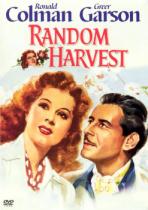Random Harvest
 Year:
Year: 1942
Film Studio: Metro Goldwyn Mayer, Loew's Incorporated
Genre: Drama, Romance
Length: 126 Min.
DirectorMervyn LeRoy (1900)
WritingClaudine West (1890)...Screenplay
George Froeschel (1891)...Screenplay
Arthur Wimperis (1874)...Screenplay
James Hilton (1900)...Novel
ProducerSidney Franklin (1893)
CinematographerJoseph Ruttenberg (1889)
MusicHerbert Stothart (1885)...Composer
StarsRonald Colman (1891) as Smithy
Greer Garson (1904) as Paula
Philip Dorn (1905) as Dr. Jonathan Benet
Susan Peters (1921) as Kitty
Henry Travers (1874) as Dr. Sims
Reginald Owen (1887) as 'Biffer'
Bramwell Fletcher (1904) as Assistant
Rhys Williams (1897) as Sam
Review Random Harvest is one of those old classic films that hopes that the viewer can suspend disbelief in reality long enough to enjoy the implausible basis for its story. Nowadays when a screenwriter wraps his narrative around the theme of amnesia, it usually means that he has run out of creative ideas to write upon, but in the 40’s this storyline was still relatively uncharted. Luckily for me, I haven’t become too jaded by modern day events and technological advances to forsake my imagination from running wild when watching a good classic drama.
Random Harvest introduces us to a soldier (Ronald Colman) who is convalescing in an asylum in a remote English town towards the end of the First World War. Suffering from a severe case of Shell Shock, he can remember nothing about himself or his past. On the night of the Armistice signing, while the guards are reveling in the proclamation of peace, he accidentally slips away from the asylum and wanders into the town. At a local pub he joins the locals in celebration and it is here where he meets Paula (Greer Garson), a traveling showgirl whose maternal instincts lead her to deduce that
‘Smithy’, as she will christen him, is in need of the kind of pampering and attention unattainable in an asylum. She therefore whisks him away to a small countryside town where over the next few months; she helps to restore his dignity and confidence.
As the months pass by they start to fall in love and are subsequently married. During his recuperation they discover that
‘Smithy’ has a talent for writing and after an editor agrees to interview him for a job at a London periodical, he sets off for the capitol. The hustle and bustle of post-war London are very far removed from the pastoral setting in which he has been living for the past year and in a moment of bewilderment he steps out into the street and into the path of an oncoming vehicle. He is knocked to the ground and when he awakens in a city hospital, we learn that his memory of his previous life has returned and that he remembers nothing that has transpired since being removed from a foxhole in France. The key to his new and now forgotten life is exactly that, a key, which is in pocket and opens the door to the cottage where his now unknown and expectant wife awaits him. It turns out that
‘Smithy’ is actually Charles Rainier, the son of a prominent aristocrat and businessman who has just passed away, leaving the bulk of his estate to his missing son.
As he settles into his old life, Charles begins to assume power over the many facets of the Rainier empire. To help him stay in focus in regards to his many holdings, he has partnered himself with his extremely efficient and beautiful secretary, who turns out to be; yes, you guessed it, Paula. When
‘Smithy’ failed to return home after his interview, she learned of his remarkable recovery from his amnesia, and decided that confronting him with the truth of their life together could trigger a relapse that could be harmful to his health. Paula hopes that in time certain circumstances will arise that will cause him to remember the life they shared together in the country. Time passes and many improbable situations arise as the film concludes with the couple reuniting and living happily ever after. To list these situations would give away the ending, so I’ll leave it at that, but I still recommend this film to anyone who enjoys good drama from the golden age of Hollywood.
Ratings Criterion5 Stars - The pinnacle of film perfection and excellence.
4 ½ Stars - Not quite an immortal film, yet a masterpiece in its own right.
4 Stars - Historically important film, considered a classic.3 ½ Stars - An entertaining film that’s fun or engaging to watch.
3 Stars – A good film that’s worth a Netflix venture.
2 ½ Stars - Borderline viewable.
2 Stars – A bad film that may have a moment of interest.
1 ½ Stars – Insipid, trite and sophomoric, and that's its good points.
1 Star – A film so vacuous, it will suck 2 hours from the remainder of your life.
½ Star - A gangrenous and festering pustule in the chronicles of celluloid.